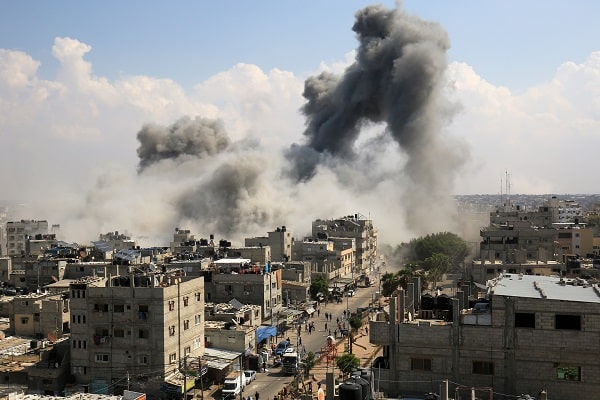
![]()
Josep Borrell, the European Union's top diplomat, has strongly condemned a recent Israeli airstrike on a school in Gaza, where dozens of displaced individuals were killed while seeking refuge. The strike has drawn widespread outrage and raised concerns about the ongoing conflict's impact on civilians.
According to a statement from Hamas' media office, the attack happened when people sheltering at the school were engaged in dawn prayers, resulting in numerous casualties. The office also noted that medical teams had not yet been able to recover all the bodies, underscoring the severity of the incident.
Borrell expressed his horror over the attack in a social media post, writing, "horrified by images from a sheltering school in Gaza hit by an Israeli strike, with reportedly dozens of Palestinian victims. At least 10 schools were targeted in the last weeks. There's no justification for these massacres." His statement reflects the growing international alarm over the rising civilian death toll in Gaza.
The Israeli military responded to the incident by claiming that the school was being used by militants from Hamas and Islamic Jihad. Lieutenant Colonel Nadav Shoshani, a spokesperson for the Israeli Defense Forces (IDF), stated that around 20 militants were operating from the school and that the compound, including a mosque that was also struck, served as a military facility for the two groups. Shoshani disputed the casualty figures provided by Hamas, suggesting they did not match the IDF's data on the munitions used and the precision of the strike.
The IDF has previously emphasized its efforts to minimize civilian casualties, including the use of precise munitions, aerial surveillance, and intelligence. However, the recurring strikes on civilian infrastructure, such as schools and hospitals, have fueled accusations that Israel is not doing enough to protect non-combatants.
Hamas condemned the airstrike as a "horrific crime" and a significant escalation in the conflict. The group also rejected Israel's claims that it uses civilian areas for military operations, a point of contention that has repeatedly surfaced during the ongoing hostilities.
International reactions to the strike have been swift. Egypt's foreign ministry condemned the attack, particularly as it came at a time when mediators were pushing for a resumption of ceasefire talks. The ministry asserted that the killing of Gaza civilians demonstrated Israel's lack of intention to bring an end to the war. As part of the efforts to halt the violence, Egypt, the United States, and Qatar have scheduled a new round of ceasefire negotiations, with concerns growing that the conflict could expand to involve other regional actors like Iran and Hezbollah.
Israeli Prime Minister Benjamin Netanyahu, who has vowed to continue military operations until Hamas is no longer a threat, confirmed that Israel would send a delegation to the ceasefire talks scheduled for August 15. A Hamas official indicated that the group was considering the latest offer for negotiations but provided no further details.
The conflict, which escalated after Hamas launched an attack on southern Israel on October 7, has resulted in significant loss of life. According to the Palestinian health ministry, nearly 40,000 Palestinians have been killed since Israel began its offensive in response, with many of the casualties reported to be civilians. Israel, however, contends that at least a third of those killed are fighters, while Hamas has not disclosed its own casualty figures.
In a related development, an independent UN-appointed expert, Francesca Albanese, accused Israel of committing "genocide" in Gaza following the school strike, which she said killed 93 people, according to local rescuers. Albanese, the UN special rapporteur on Palestinian rights, criticized Israel's actions on social media, stating, "Israel is genociding the Palestinians one neighbourhood at a time, one hospital at a time, one school at a time, one refugee camp at a time, one safe zone at a time," adding that these strikes were being carried out with "US and European weapons."
Albanese’s remarks come in the context of a previous report issued in March, where she argued that there were "reasonable grounds" to conclude that Israel had committed acts of genocide in Gaza. Israel, which has long criticized Albanese and her mandate, condemned her report as a "distorted version of reality." While Albanese also condemned Hamas for its initial attack on Israel, she emphasized her broader critique of Israel's actions.
It is important to note that while special rapporteurs are appointed by the United Nations Human Rights Council, their statements do not represent the official position of the UN.